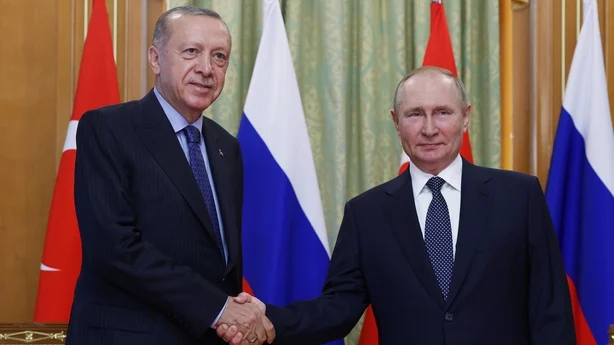Barely 48 hours before Russian President Vladimir Putin and his Turkish counterpart, Recep Tayyip Erdogan, were due to hold talks, it was has been reported that Russia has launched an air attack on one of Ukraine’s biggest grain exporting ports.
Residents of Izmail port, one of Ukraine’s two main grain exporting ports on the Danube River in the Odesa area, were told to seek cover by the country’s air force on Monday.
A few Ukrainian media outlets reported hearing explosions nearby.
The attack happened as Putin and Erdogan were about to meet in the Black Sea resort of Sochi, Russia, to discuss a deal to sell grain from Ukraine, which helped alleviate a food crisis in portions of Africa, the Middle East, and Asia.
Africa Today News, New York reports that the deal which was brokered by the United Nations and Turkey in July 2022 – had allowed nearly 33 million metric tonnes (36 million tonnes) of grain and other commodities to leave three Ukrainian ports despite the Russian invasion.
But Moscow quit the agreement about six weeks ago, complaining that its food and fertiliser exports faced obstacles and that not enough Ukrainian grain was going to countries in need.
Since then, it has launched frequent attacks on the ports of the Danube River, which has emerged as Ukraine’s major route for exporting grain.
Read Also: BRICS’ Soaring Influence Will Shift Global Structure – Putin
Monday’s attack – the scale of which was not immediately known – followed Russian attacks on Sunday on the other major Danube port of Reni, in which the port’s infrastructure was damaged and at least two people were injured.
A top aide to Erdogan told Turkey’s A Haber television channel on Sunday that the meeting between the Russian and Turkish leaders will “play the most important role” in reviving the grain corridor.
“The current status [of the grain deal] will be discussed at the summit on Monday. We are cautious, but we hope to achieve success because this is a situation that affects the entire world,” said Alif Cagatay Kilic, Erdogan’s chief foreign policy and security adviser.
Erdogan – who has maintained close ties to Putin during the 18-month war, including by refusing to join Western sanctions against Russia – has repeatedly pledged to revive the Black Sea deal.
The Turkish president has previously indicated sympathy with Putin’s position, saying in July that the Russian leader had “certain expectations from Western countries” over the grain deal and that it was “crucial for these countries to take action in this regard”.
Russia has said that if demands to improve its exports of grain and fertiliser were met, it would consider resurrecting the Black Sea agreement. While Russian exports of food and fertiliser are not subject to Western sanctions, Moscow has said restrictions on payments, logistics and insurance have hindered shipments.
One of Russia’s main demands is for the Russian Agricultural Bank to be reconnected to the SWIFT international payments system. The European Union cut it off in June 2022.
The United Nations has also stepped up its efforts to revive the deal.
UN Secretary-General Antonio Guterres said on Thursday that he had sent a letter to Russian Foreign Minister Sergey Lavrov with “concrete proposals” aimed at getting Moscow’s exports to global markets.

